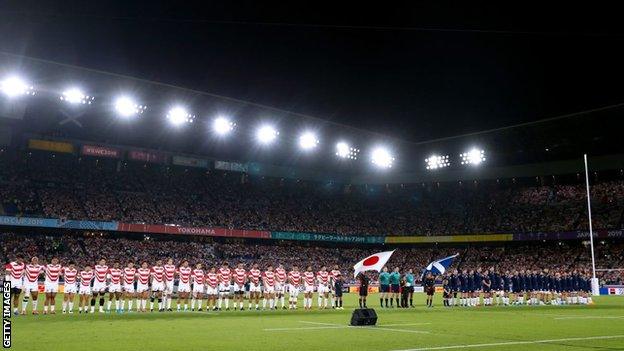Typhoons & a torrent of tribulations: Scotland's storm with World Rugby rages on
- Published
- comments

A minute's silence was held before Japan's tie with Scotland for the victims of Typhoon Hagibis
World Rugby has given the Scottish Rugby Union 48 hours to apologise for bringing the game into disrepute in the days leading up to Typhoon Hagibis and the subsequent loss to Japan in Yokohama. They may have to wait a while. If Murrayfield is to grovel in this increasingly bitter business with the game's governing body then there are no signs of it happening.
If the SRU stands its ground, what then? Another charge, increased punishment? Murrayfield want all of this to go to arbitration but it's a fanciful idea. We know this acrimonious dispute isn't quite over, but what we don't know is where on earth it's heading next.
When World Rugby's Disputes Committee, consisting of two Queen's Counsels from England and New Zealand and one Senior Counsel from Australia, started to layer on the criticism of the SRU you had to wonder if they reached for a pen or a trowel as they did so.
There is a lot of flak in the 48-page conclusion. Mark Dodson, Scottish Rugby's chief executive, gets it in the neck.
Dodson's words "brought rugby into disrepute," the committee has concluded. The SRU "lowered the esteem of the game" with comments that were "inaccurate, wrong and misleading." There was more. Lots more. Scottish Rugby has been found guilty of "egregious behaviour" with its conduct deemed to be "extraordinarily insensitive". Part of the SRU's case is termed a "fallacy", other parts dismissed as "untenable". It's weighty stuff.
"We find that this [the SRU's attempts to get the game delayed because of Hagibis] was part of a campaign wrongly played out in public designed to put pressure on Rugby World Cup Limited to have the match played when it was properly and understandably endeavouring to plan for and deal with the consequences of a substantial imminent natural disaster."
Deeply divisive week
The SRU can weather the fine of £70,000 that comes with this verdict, but the allegation of heartlessness will stick in its craw. It should be noted that while lecturing Dodson and company on a supposed lack of respect, the committee referenced a previous typhoon that hit Japan, but they couldn't get the spelling right.
Typhoon Faxai - not Typhoon Faxais as the committee called it on two occasions in their written verdict - hit town a month before the beginning of the World Cup and killed three people while causing $7bn worth of damage.
If you're going to accuse somebody of disdain then it's best you don't open yourself up to a similar accusation while doing so.
We should recap what went down in that deeply divisive week in October. From the Monday it was known Hagibis was going to be one of the most violent typhoons in decades. It was raging across the Western Pacific at a terrifying speed.
The tournament organisers decided to cancel two games that could have been close to the eye of the storm. New Zealand versus Italy and England versus France were both ditched. Tournament rules decreed that the games could have been moved to another venue - World Rugby said that had become a logistical impossibility - but not to another day. The games were off. End of story.
The cancellations had no material impact on New Zealand, England and France who had already qualified for the quarter-finals, but Italy were slightly different. Theoretically they could still qualify had they beaten New Zealand by a massive score. A double miracle required, but they were denied their shot. In the aftermath, Sergio Parisse, their great captain, said that had New Zealand needed points from that game to make the knockouts then it would have gone ahead. Few disagreed with him.
What's intriguing here is that the Italian Federation has not been sanctioned for Parisse bringing the game into disrepute - they call his remarks "unacceptable" and that's it - but Dodson, in the judgement, has been carpeted for more or less repeating what Parisse said.
Retaliation, worry & rising temperatures
The storm was predicted to hit Yokohama hard on the night before Scotland played Japan. This is when the relations between the SRU and the game's governing body started to become seriously troubled.
The SRU wanted the game moved to Monday instead of Sunday on safety grounds. World Rugby said no. Rules are rules. What was good for England, France, New Zealand and Italy was also good for Scotland. Either the game went ahead on Sunday or it would be called off - and Scotland would be out of the World Cup.
Scotland retaliated by saying there was a force majeure clause in the participation agreement. World Rugby said no again and added Scotland had signed up to this deal. They also chastised them for a lack of compassion for what was about to befall Japan.
That incensed the SRU. They were desperate in those critical days. As one source close to the story said about the growing fear the Scotland versus Japan tie was going to be cancelled: "They feel they are on the edge of being shafted by World Rugby." Dodson certainly acted like a worried man.
Sitting on his hands and hoping for the best wasn't an option for him. While being cognisant of the devastation that was about to be caused by Hagibis he felt, as Scottish Rugby's chief executive, he needed to campaign to get the game on, somewhere, anywhere. The time and place didn't matter.
In truth, in its verbal battle with World Rugby, the SRU made some blunders. By allowing the opinion to be formed - through an unnamed spokesman and also through their own QC - that it was threatening legal action and may consider mounting a claim for "substantial compensation" in the event of the game being abandoned, the SRU made it easy for World Rugby to accuse it of greed in the face of impending tragedy.
As the storm approached and the odds of the game going ahead appeared to be reducing, the temperature rose. Brett Gosper, chief executive of World Rugby, issued a letter of warning to the SRU when the report about possible legal action was published. Dodson was told to refrain from such comment, but he doubled down with an interview on the Today programme on BBC Radio 4 and then a press conference.
He knew that he was now in breach of the rules and punishment was coming. He was aware World Rugby wanted him to sit down and shut up. When the governing body charged and then found him guilty Dodson would have been the least surprised person in the process, but what exists now is an anger that Scottish Rugby's behaviour has been put under the microscope while few are doing the same with the World Cup organisers.

Japan triumphed 28-21 to knock Scotland out of the World Cup
'Contingency questions need to be asked'
A light needs shining on World Rugby's much vaunted contingency planning, but who has the heart for it? Scotland are alone in this. That's not to say it does not have a case. It does.
The decision to make Japan the host country was announced in 2009. A decade to prepare. There was concern all along that the tournament was going to be held in typhoon season - July to October - but with the really active months being August and September.
World Rugby spoke constantly about their "robust contingency plans". Those contingency plans were needed during the tournament but they didn't appear to be there. The Guardian newspaper reported, external - and the report was never denied by World Rugby - that the contingency plan for extreme weather in Yokohama was to move games scheduled from there to Tokyo Stadium, just 14 miles away. Typhoons are a tad bigger than 14 miles wide. At its peak, Hagibis was measured at 870 miles wide. Moving games along the road wasn't deemed much of a plan.
This is where Scottish Rugby want to take this story and where World Rugby would perhaps rather not take it. Everybody knew that even though the World Cup was being held towards the end of the typhoon season that a typhoon was still not a possibility but a probability. Even before Hagibis, statistics showed three of the top 10 most expensive typhoons in Japan in the last 50 years occurred in the last 24 months. You didn't need to be Confucius to know about the threat.
Hagibis was unusual in scale, but it's not like there were no warnings. It was the fourth major rainfall disaster to afflict Japan in the past 14 months. Also, the notion that you couldn't fully legislate for a devastating typhoon so late in typhoon season is deeply questionable.
Again, precedent should have prepared them. Typhoon Phanfone struck from late September to 12 October in 2014, killing 11 people. In the same year, Typhoon Vongfong hit from early to mid-October. Faxai arrived in September this year. Typhoon Jebi lasted into September last year. More lives were lost. More than $12bn of damage was done. World Rugby knew what it was getting into when, correctly, awarding Japan the World Cup, but there are legitimate questions around the contingency planning it said for years was firmly in place.
Dodson and the SRU are now in a stand-off with the governing body. The SRU will express regret as long as World Rugby expresses regret. The SRU will hold up its hand to certain things if World Rugby does the same. There's no sign of that. The SRU has been told to sit down, say sorry and stump up. There's a way to go before any of that happens, if it happens at all.
